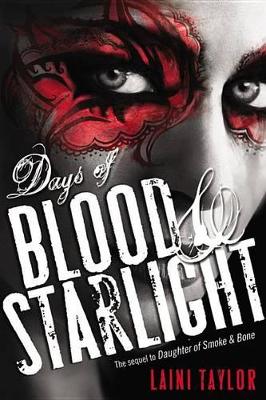Reviewed by girlinthepages on
In order to organize my thoughts, I've decided to go with the good old fashioned pros and cons format:
The Good:
1. Zuzanna! I absolutely love her, and was thrilled to see a lot more of her in this book. Karou is often hard to relate to (and why shouldn't she be, she isn't even really human), but Zuze is that fiery, adorable, completely insufferable best friend that everyone wishes they had and wishes they were. Her and Mik are the link of relatability in the story for the reader, as they are completely human, but with open hearts and open minds that allow them to integrate themselves into Karou's fantastic world.
2. Resurrection. I don't know about everyone else, but what drew me to the books initially was the mythology and Brimstone's magic. In this book the resurrection process is explained in so much more depth, about the relationship with pain and magic, tithing, souls, and gleaning, and seeing resurrections in action was fascinating each time.
3. The Seraphim. Despite how Karou and Akiva's relationship left of at the end of Daughter of Smoke and Bone, I was still fascinated by the Seraphim and how their society functions, as you all know my obsession with angel books. The angel hierarchy is explained in detail, along with Akiva's mysterious lineage, and more character development of Hazael (my personal favorite after Zusanna) and Liraz.
4. War. This is war in a realistic sense. It is not resolved in one book, with some teenage girl heroine who somehow manages to single handedly stop a paranormal war and restore peace. Karou is often on the fringes of knowledge, and her tension and anxiety is tangible to the reader. Her choices aren't black and white as well, and she recognizes that no matter how the war ends, it means the deaths of millions of innocents, seraph and chimaera. This is a bloody, emotional, realistic, heart-wrenching depiction of war and battle that exposes true character motives and loyalties.
5. Controversial Topics. ***Spoiler Ahead*** Karou suffers abuse at Thiago's hands, as she lives most of the book as his prisoner for "the greater good." She is emotionally manipulated, forced to physically harm herself (to perform the resurrections) and toward the end of the book very narrowly escapes sexual assault. Karou is not the vibrant girl with a personality to match her hair color like in the first book. This is wartime and she suffers as much or more than most, and her character goes through dips and arcs throughout the story. We see her loose and regain her strength multiple times, and her decisions are never made lightly. Taylor writes Karou as a realistic victim and has her confront tough but realistic consequences of essentially being a prisoner of war, and I applaud her of not shying away from topics such as assault, which are very real and experienced by many people in the targeted age range of the book. Seeing how Karou deals with the aftermath will be interesting. ***End Spoiler***
6. Cliffhangers! Taylor literally brings you to a point in the story when every chapter ends with a major cliffhanger and the next chapter shifts perspectives and then ALSO ends with a cliffhanger, only to move back to the first character in the next chapter. It's infuriating and wonderful at the same time because it literally prevents you from being able to find a suitable place to put the book down, you just have to keep reading!
7. The Ending. I thought the book was getting a little predictable about halfway through (Karou has a revelation that is pretty obvious to the reader from the beginning) so I wasn't sure if the rest of the book would surprise me. But it did. Oh, it did.
The Bad
1. The Pace. The beginning of the book was slow. For the first one hundred pages or so I was a little bored. It didn't have the charm of the first book, as things are much darker, and I was worried the same magic wasn't going to translate to the sequel. But I'm so glad I stuck with it because at around 200 pages in things start really picking up. This is one of the main reasons why I didn't give the book a 5/5 review, because I really wish it had gripped me right from the beginning.
2. Relevance. I think what contributed to my lack of interest at the beginning is that the novel would pan to different characters I had never met before in disjointed fragments, leaving me asking "so what?" and "Why should I care?" Later on these fragments weave together, but I still feel that there are some aspects, details, and chapters that the book could have done without.
3. Characters. There are so. many. characters. It's almost impossible to keep all of them straight, it would have been useful for the book to have an index in the back to accompany the map of Eretz in front. (Sidenote: Where does Laini Taylor come up with all of these names? They're fascinating and I'd love to know where she pulls her inspiration from!)
Overall, Days of Blood and Starlight started slow but finished strong, and has me bouncing up and down like Zuzanna in anticipation of the next one. Taylor does one of the most phenomenal and intricate jobs world-building of any YA Author I've read, and I'm definitely adding her other works to my to-read shelf as she has unparalleled sophistication and detail to her writing. If you're looking for instant gratification I wouldn't recommend this book or series, but if you're willing to wait for the series to simmer under the surface and commit yourself to learning this world Days of Blood and Starlight is definitely worth the read.
Reading updates
- Started reading
- 15 February, 2014: Finished reading
- 15 February, 2014: Reviewed
